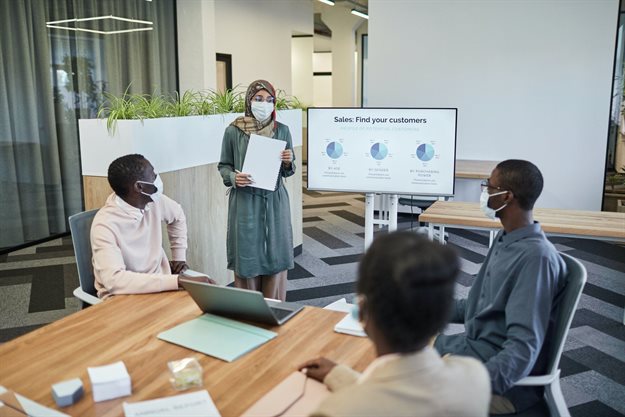While we've all discovered that we can work from home, there are benefits to working on-site at least some of the time with colleagues, says Paul Stevens, CEO of Just Property. This is especially true for entry-level or new employees who may find it challenging to assimilate into company culture and to get feedback from colleagues or network with senior staff from a laptop at home.
“I see the upside to being able to work from anywhere but I still feel a strong need for a physical space for my employees to work in and collaborate with their colleagues. As a result, our own head office spaces will inevitably adapt so that we’re better organised for collaboration," says Stevens.
"The future is likely to be a hybrid one, where many companies are more flexible than in the past but demand some in-office time from their staff - something like IBM and Google’s system where most of the workforce work at least three days a week in the office and two days wherever they work best,” he says.
Opportunities in South Africa
With corporate tenant employees needing space to work and brainstorm/bounce ideas around with others, many commercial property owners are currently reworking their office spaces so that they’re better organised for collaboration.
“There is an opportunity for South African office-space owners to adapt their spaces to accommodate this key emerging trend: spaces that allow for effective face-to-face and online collaboration,” says Stevens.
There is also an opportunity in mitigating some of the unique factors at play in the South African landscape, he says. Increasingly, there is frustration with poor infrastructure, having to work around load shedding and unstable internet connectivity. Commercial landlords who invest in off-the-grid infrastructure that gives employers and their workforces a stable, reliable environment will thrive now and in the future. That means investment in power, in water supply and even transportation. Being agile in terms of what you offer your tenants will be a critical success factor, says Stevens.
For landlords who are constrained by the effects of Covid-19, it may worth looking at ways to share the costs of ownership: offering the same space to multiple tenants whose workforce is not office-bound 9-5, Monday to Friday, or sub-dividing the space into smaller areas to let. But this comes with risks, warns Just Property Commercial franchisee Mark Connett: "Understanding the rules and regulations related to commercial property, having high-quality lease agreements and a strong property management team in place is more important than ever.”
Nqobile Dludla 20 May 2021 Pros and cons of letting to firms vs individual tenants
A lease should always be signed by a tenant, even a short-term or flexible one. Terms of engagement and use are vital to protect all parties involved. There are also considerations like PoPIA to be factored in – how will access be controlled? How will records of permissible people be handled?

Paul Stevens, CEO of Just Property
Letting individual desks could conceivably give a landlord greater returns though:
- The sum of multiple, smaller rents collected may exceed what one could get from a single lease.
- With the right analytics and data insights, a landlord could overbook the individual desks, knowing that some no-shows are inevitable (taking a leaf out of the airlines’ books).
- The emergence of new SA enterprises like Inospace and Neighbourgood show that there is a demand for smaller spaces with more flexible terms.
That said, Connett advises that there are some negative aspects that owners should be aware of:
- The vetting of individuals and management of these contracts can be very onerous, so landlords looking at co-working or hot-desk scenarios (i.e., letting individual desks to individual workers) will need to have a strong administrative division to, for example, handle desk bookings. Additional budget will be necessary for background and/or individual credit checks.
- Feeding the pipeline of clients who want flexible rental terms, whether short-term leases of office space or on individual desks, will be a constant and relentless challenge. A keen knowledge of your target market and how to attract them will be critical.
- Additional security may be needed to mitigate the risk of irregular/ ever-changing traffic through your doors.
- An attractive workspace means the provision of cleaning staff, good coffee and other consumables that the landlord will likely be responsible for. All this will result in more admin and more cost for the landlord to factor in.
- The world is an uncertain and unsettled place right now and not everyone is comfortable with sharing public spaces. Co-working spaces may not be popular enough right now to be sustainable, especially with the risk of future waves of Covid-19 infections.
Is this a good time to buy commercial property?
Stevens sees real opportunity in rethinking the use of existing spaces. “Overseas, we’ve seen shopping malls being converted to warehousing. Here we’ve seen warehouses being converted to multi-use spaces: office, storage and even light industrial use. Lower-end hotels can be flipped into affordable housing or student accommodation and coworking spaces; luxe rooms and suites could be offered as remote workstations or offices for those who don’t get the peace they need at home. The list goes on,” Stevens enthuses.
The commercial property market has taken a beating. Investors with cash flow should definitely take advantage of the opportunity to acquire properties that can be tailored to a new way of working and prices that we believe will recover, concludes Stevens.








































